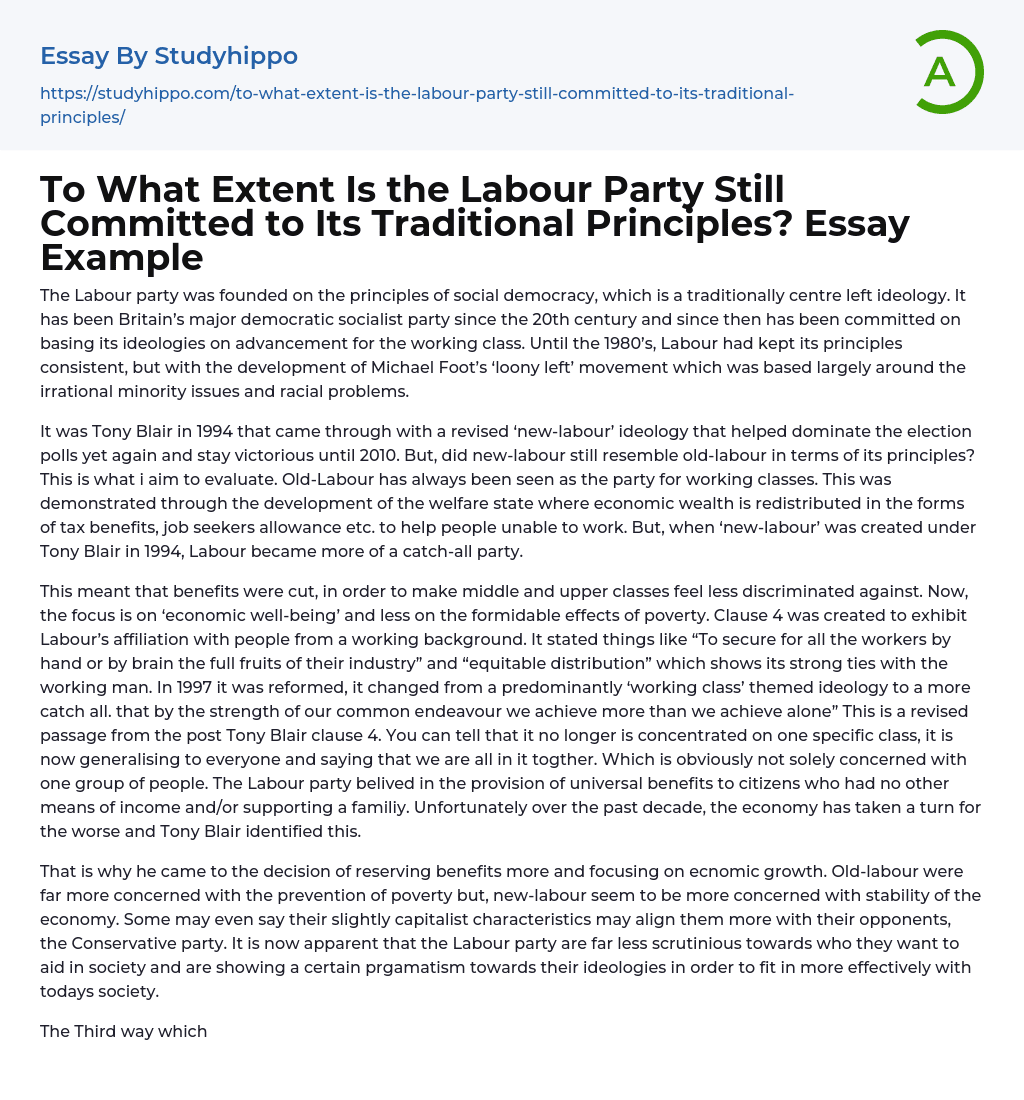

To What Extent Is the Labour Party Still Committed to Its Traditional Principles? Essay Example
The Labour party was founded on the principles of social democracy, which is a traditionally centre left ideology. It has been Britain’s major democratic socialist party since the 20th century and since then has been committed on basing its ideologies on advancement for the working class. Until the 1980’s, Labour had kept its principles consistent, but with the development of Michael Foot’s ‘loony left’ movement which was based largely around the irrational minority issues and racial problems.
It was Tony Blair in 1994 that came through with a revised ‘new-labour’ ideology that helped dominate the election polls yet again and stay victorious until 2010. But, did new-labour still resemble old-labour in terms of its principles? This is what i aim to evaluate. Old-Labour has always been seen as the party for working classes. This was
...demonstrated through the development of the welfare state where economic wealth is redistributed in the forms of tax benefits, job seekers allowance etc. to help people unable to work. But, when ‘new-labour’ was created under Tony Blair in 1994, Labour became more of a catch-all party.
This meant that benefits were cut, in order to make middle and upper classes feel less discriminated against. Now, the focus is on ‘economic well-being’ and less on the formidable effects of poverty. Clause 4 was created to exhibit Labour’s affiliation with people from a working background. It stated things like “To secure for all the workers by hand or by brain the full fruits of their industry” and “equitable distribution” which shows its strong ties with the working man. In 1997 it was reformed, it changed from a predominantly ‘working class’
themed ideology to a more catch all. that by the strength of our common endeavour we achieve more than we achieve alone” This is a revised passage from the post Tony Blair clause 4. You can tell that it no longer is concentrated on one specific class, it is now generalising to everyone and saying that we are all in it togther. Which is obviously not solely concerned with one group of people. The Labour party belived in the provision of universal benefits to citizens who had no other means of income and/or supporting a familiy. Unfortunately over the past decade, the economy has taken a turn for the worse and Tony Blair identified this.
That is why he came to the decision of reserving benefits more and focusing on ecnomic growth. Old-labour were far more concerned with the prevention of poverty but, new-labour seem to be more concerned with stability of the economy. Some may even say their slightly capitalist characteristics may align them more with their opponents, the Conservative party. It is now apparent that the Labour party are far less scrutinious towards who they want to aid in society and are showing a certain prgamatism towards their ideologies in order to fit in more effectively with todays society.
The Third way which takes old-labour, thatcherism and liberal democrarcy is definately more pro-active than wiping out just under half of the voting population with your political views. Ed Milliband’s take on the third way is even said to be moving slightly right, which proves that Labour no longer prioritise with the working class and they are aligning themselves more fully with
all classes and situatuions in the U. K. This is good for democrarcy, not good for the preservation of Labours traditional socialist values.
- Absolutism essays
- Appeal essays
- Bourgeoisie essays
- Contras essays
- Corporate Governance essays
- Corruption essays
- Democracy essays
- Democratic Party essays
- Developed Country essays
- Dictatorship essays
- Elections essays
- European Union essays
- Federalism essays
- Foreign essays
- Foreign policy essays
- Gentrification essays
- Hillary Clinton essays
- Income Tax essays
- International Relations essays
- John Marshall essays
- John Stuart Mill essays
- Left-Wing Politics essays
- Liberty essays
- Military essays
- Monarch essays
- Monarchy essays
- Political Corruption essays
- Political Party essays
- Political Science essays
- President Of The United States essays
- Public Service essays
- Red Cross essays
- Reform essays
- Republic essays
- Revenge essays
- Social Security essays
- Sovereign State essays
- State essays
- Supply essays
- Terrorism essays
- United Nations essays
- World Trade Organization essays
- Accident essays
- Awareness essays
- Benefits of Volunteering essays
- Challenges essays
- Childhood Memories essays
- Decision essays
- Driving essays
- Event essays



